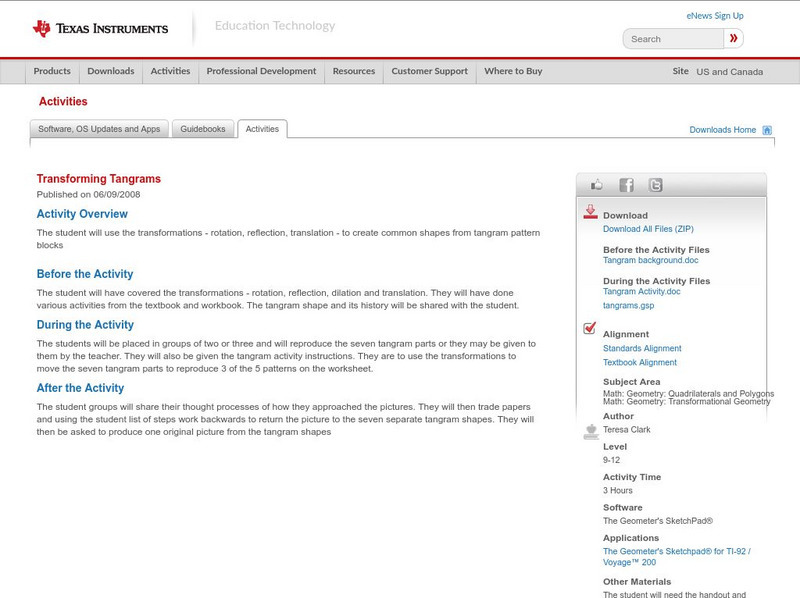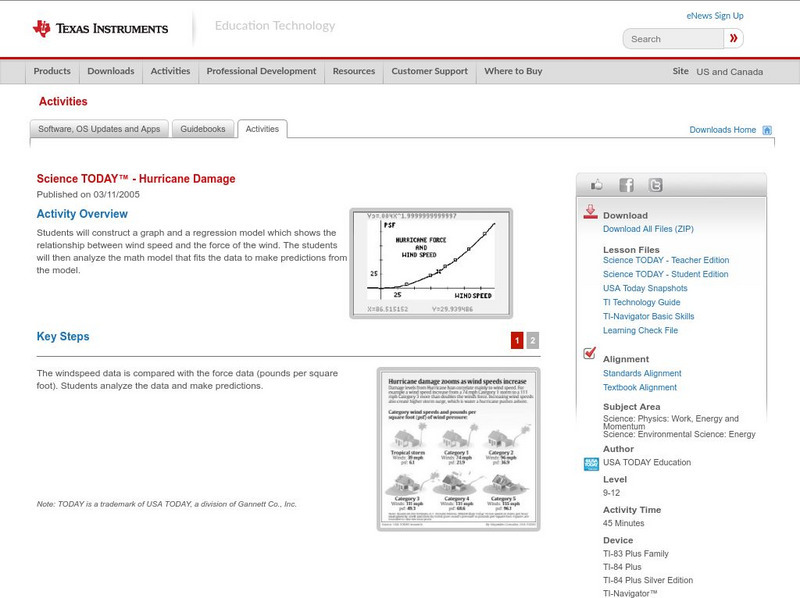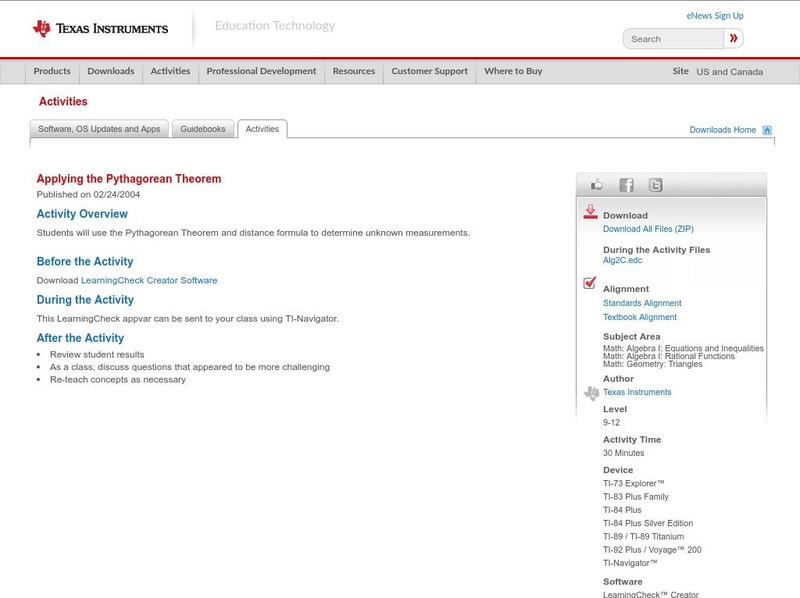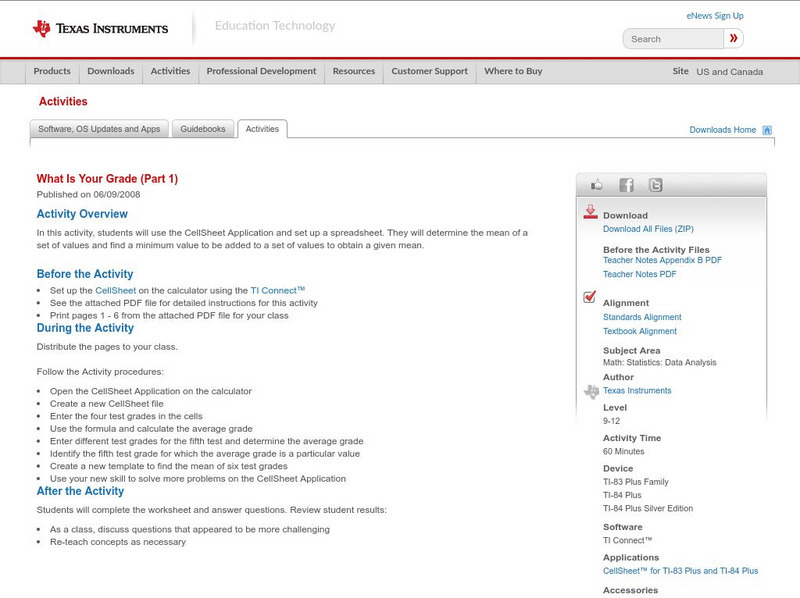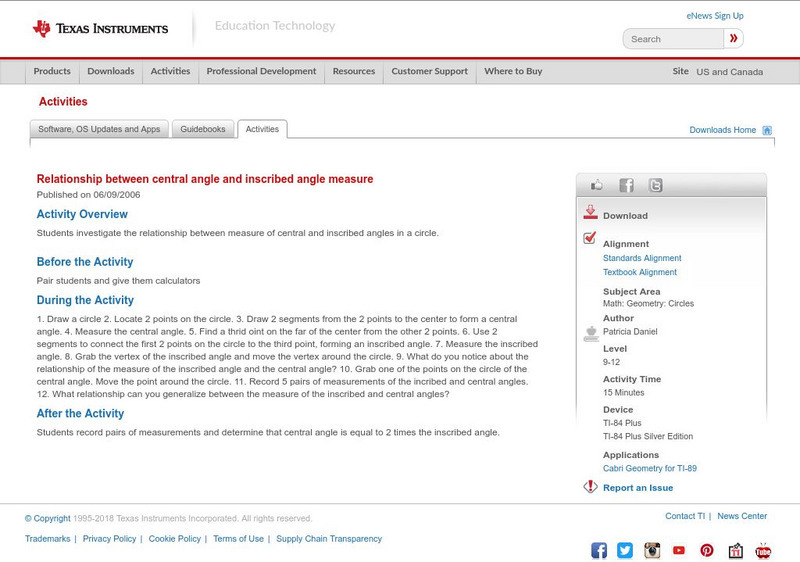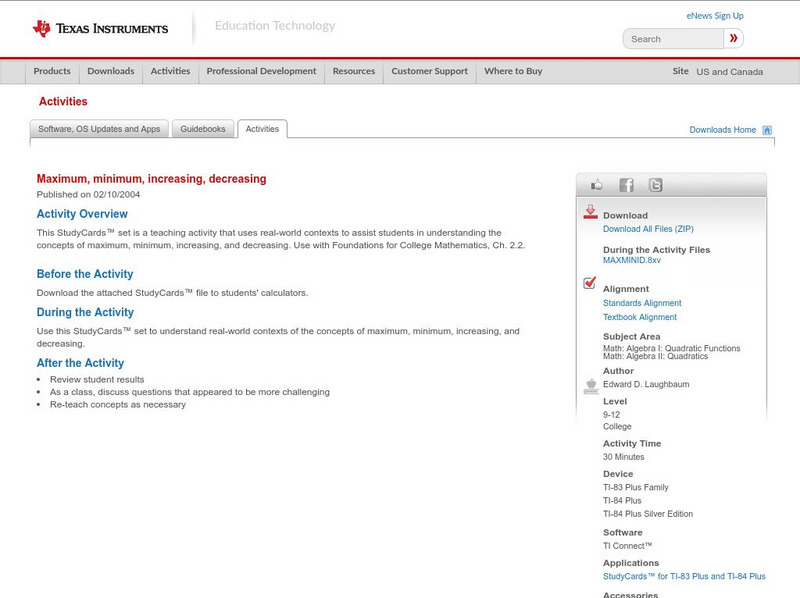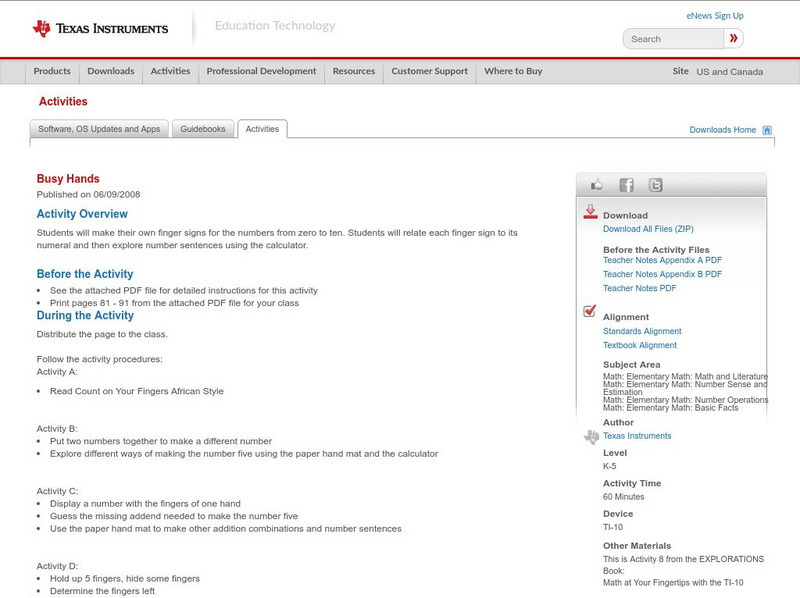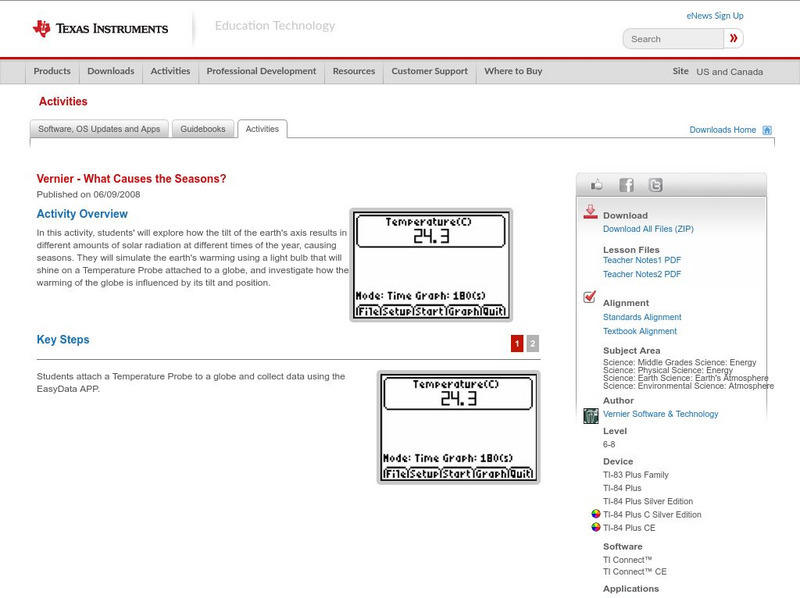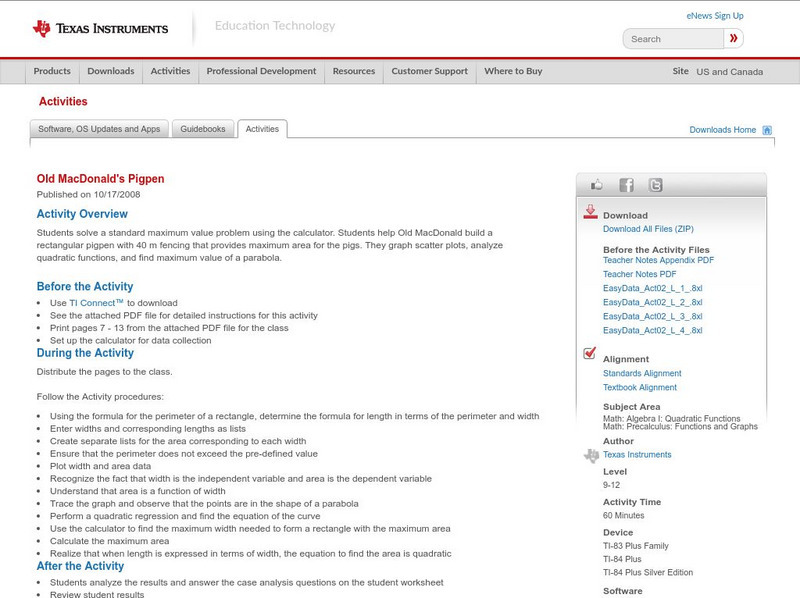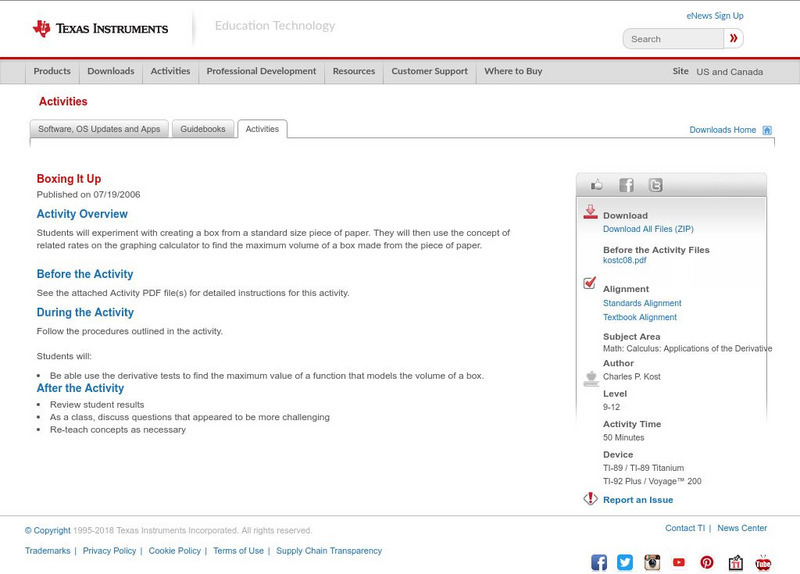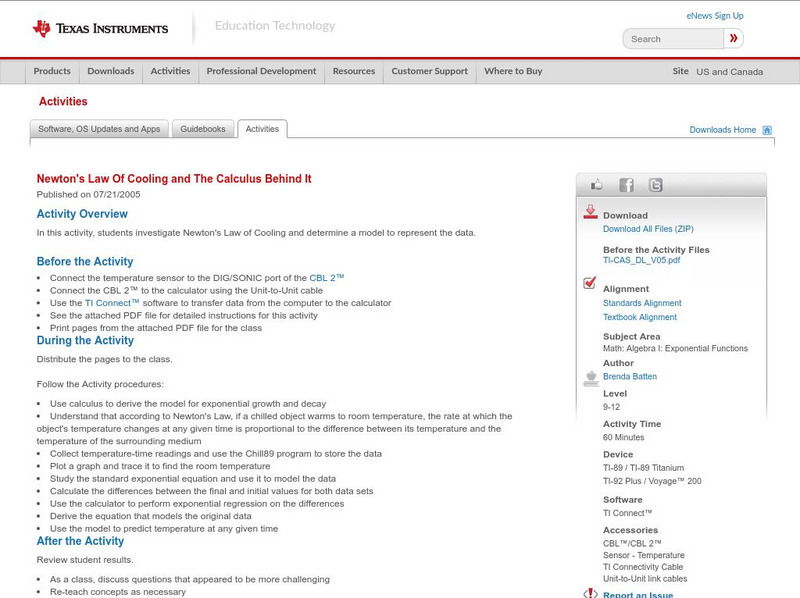Texas Instruments
Texas Instruments: Stay Tuned: Sound Waveform Models
In this activity, students' will record the sound waveform of a tuning fork and analyze the waveform to determine frequency, period and amplitude information. They will model the waveform using trigonometric functions.
Texas Instruments
Texas Instruments: Quotient Rule
This activity will use the capabilities of the graphing calculator to illustrate the symbolic derivative quotient rule.
Texas Instruments
Texas Instruments: Transforming Tangrams
The student will use the transformations - rotation, reflection, translation - to create common shapes from tangram pattern blocks
Texas Instruments
Texas Instruments: Numb3 Rs: Harmonizing Means
Based off of the hit television show NUMB3RS, this lesson exposes students to a different type of average, the harmonic mean. Although it is briefly reviewed in the lesson, students are expected to already be familiar with arithmetic and...
Texas Instruments
Texas Instruments: Is There a Limit to Which Side You Can Take?
In this activity, students will investigate the given function, and state and explain the limit at a particular value. They also state and explain the limit at a particular value from a graph.
Texas Instruments
Texas Instruments: Science Today Hurricane Damage
Students will construct a graph and a regression model which shows the relationship between wind speed and the force of the wind. The students will analyze the math model that fits the data to make predictions from the model.
Texas Instruments
Texas Instruments: Applying the Pythagorean Theorem
students can use the Pythagorean Theorem and distance formula to determine unknown measurements.
Texas Instruments
Texas Instruments: What Is Your Grade (Part 1)
In this activity, students can use the CellSheet Application and set up a spreadsheet. They will determine the mean of a set of values and find a minimum value to be added to a set of values to obtain a given mean.
Texas Instruments
Texas Instruments: Math Today Challenge New Color of Money
In this activity, students will read about the changes in the "new money" and then create a graph to represent various combinations of currency produced. This activity provides an excellent example of discrete, real-world data.
Texas Instruments
Texas Instruments: Numb3 Rs: Pythagorean Triples
Based off of the hit television show NUMB3RS, this lesson has students explore the notion of Pythagorean triples, the "traditional" method for finding Pythagorean triples, and a method to find triples which utilizes the Fibonacci...
Texas Instruments
Texas Instruments: Relation Between Central Angle and Inscribed Angle Measure
Students investigate the relationship between measure of central and inscribed angles in a circle.
Texas Instruments
Texas Instruments: Eating Out
In this activity, students examine data and make graphs to represent the data. They interpret the data and answer questions. They also learn to calculate percentages and angle measures.
Texas Instruments
Texas Instruments: Maximum, Minimum, Increasing, Decreasing
This StudyCard set is a teaching activity that uses real-world contexts to assist students in understanding the concepts of maximum, minimum, increasing, and decreasing.
Texas Instruments
Texas Instruments: Busy Hands
In this activity, students will make their own finger signs for the numbers from zero to ten. Students will relate each finger sign to its numeral and then explore number sentences using the calculator.
Texas Instruments
Texas Instruments: To the Moon
Students can use linear regression to generate the formula for circumference.
Texas Instruments
Texas Instruments: Bouncing Ball
In this activity, students' will create a Height-Time plot for a bouncing ball. They will examine how the ball's height changes mathematically from one bounce to the next.
Texas Instruments
Texas Instruments: Visualizing Related Rates Problems
This activity models related rates problems using parametric equations for simulation purposes.
Texas Instruments
Texas Instruments: Solving Problems Using Trigonometry
Solving real life problem using trig ratios. Example: Finding the angle of elevation or the angle of depression. Finding the angle between two lines. Finding equation of a line that passes through two points.
Texas Instruments
Texas Instruments: What Causes the Seasons?
In this activity, students' will explore how the tilt of the earth's axis results in different amounts of solar radiation at different times of the year, causing seasons. They will simulate the earth's warming using a light bulb that...
Texas Instruments
Texas Instruments: Old Mac Donald's Pigpen
In this activity, students solve a standard maximum value problem using the calculator. Students help Old MacDonald build a rectangular pigpen with 40 m fencing that provides maximum area for the pigs. They graph scatter plots, analyze...
Texas Instruments
Texas Instruments: Boxing It Up
In this activity, students will experiment with creating a box from a standard size piece of paper. They will then use the concept of related rates on the graphing calculator to find the maximum volume of a box made from the piece of paper.
Texas Instruments
Texas Instruments: Motion in One Dimension & Freefall Motion
This activity is designed to assess the comprehension of concepts related to motion in one dimension and freefall motion.
Texas Instruments
Texas Instruments: Newton's Law of Cooling and the Calculus Behind It
In this activity, students investigate Newton's Law of Cooling and determine a model to represent the data.
Texas Instruments
Texas Instruments: Differential Equations on the Ti 92 Plus
This activity acquaints students with the features and capabilities of the calculator that are used to study concepts related to differential equations. Students graph and solve a range of differential equation problems.




